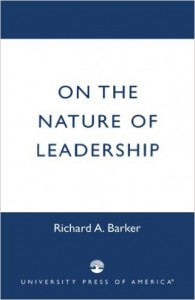
Richard A. Barker
5.0 out of 5 stars 6 Star Paradigm Shifting Book — Destroys Existing Leadership “Industry”, July 13, 2015
I received this book as a “must read” gift from a colleague finishing his doctorate with a focus on transformative leadership, and after reading it, I quite agree, to the point of rating this book at 6 stars (my top 10% across 2000 plus non-fiction books). In brief, this book is a massive detailed literature review that covers academic and practitioner definitions of leadership and finds them all wanting for the simple reason that they are mired in leadership as a supervisory hierarchical relationship in a reductionist system in which the followers are the means and the ends are defined by someone other than the followers.
This book can be read deeply or quickly, as you might wish. Read deeply, it is a systematic dismantling — even trashing — of the entire leadership “industry” and all of the books, all of the courses, all of the “best practices” that in the aggregate have left us with a world dominated by the 1% and the 99% impoverished and abused. The “leaders” have, in brief, lacked both intelligence and integrity.
I remember discussing this point with Harrison Owen, author of Wave Rider: Leadership for High Performance in a Self-Organizing World and having him tell me that after he articulated his original concept of “open space” as explained in his earlier work, Open Space Technology: A User's Guide, to a top manager for a major national leadership association, he was told something along these lines: “You do realize that you have just destroyed the basis for a multi-billion dollar leadership training industry.” Precisely.
There are several major aspects of this book and the approach to leadership that I want to highlight here with the observation that this book eliminates leaders and restores the Athenian concept of every citizen a leader, for the best of outcomes.
01 The West and its industrial hierarchies and scientific reductionalism have perverted the meaning of “ethics” which has in the past been about seeking the best means and best ends for the greater good of the community — ethics as happiness as found in the Constitution of the USA is about the greater good, not selfish joy.
02 All organizations are political entities and communities, and in the ideal all should be democratic. Richard Wolf, author of Occupy the Economy: Challenging Capitalism (City Lights Open Media) speaks to this point on his own.
03 Michaiavelli's better known “The Prince” is not, in the author's view, Machiavelli's best work. He recommends instead — and provides a detailed summary of — Discourses.
04 Leadership is a process by which communities, enabled but not directed, adapt and transform. Status quo organizations do not have leaders, they have managers and supervisors.
05 Leadership is as important during the degenerative phases as in the constitution phrase. Leadership thus represents DEVIATION from CONVENTION. QUOTE (104): A person who consistently hods an unconventional view may be considered a deviant right up until the time when that unconventional view is widely discovered by others as the way to go.”
06 Education today sucks at creating informed educated citizens ready to be co-leaders in a constructive democracy that works toward ends good for all. The author spends several pages slamming education for not teaching critical thinking and comprehensive understanding (replacing these with empiricism and experimental lucifera); with abandoning true educational objectives for vocational training; and with being intellectually and morally lazy, fragmented by discipline and sub-discipline to the point of being an archipelago of babbling idiots.
07 The author concludes by suggesting that just as we must see leadership and citizenship in a new way, so also must be take a new view of everything — science, business, politics, life.
The author singles out J.C. Rost and R.M. Pirsig as worthy of deeper study, one work for each is linked below:
Leadership for the Twenty-First Century
Lila: An Inquiry Into Morals
I have a review list, “Worth a Look: Book Reviews on Leadership for Epoch B” that is easily found online, all leading back to their respective Amazon pages; with my remaining four links I will highlight four books most might not think of as essential to this topic and our shared future.
Philosophy and the Social Problem: The Annotated Edition
The Tao of Democracy: Using Co-Intelligence to Create a World that Works for All
Where Have All the Leaders Gone?
The Leadership of Civilization Building: Administrative and civilization theory, Symbolic Dialogue, and Citizen Skills for the 21st Century
Best wishes to all,
Robert David STEELE Vivas
INTELLIGENCE FOR EARTH: Clarity, Diversity, Integrity, & Sustainability




